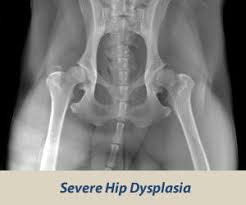Omega 3 fatty acids (fish oil) and glucosamine are both commonly recommended for dogs with hip and elbow dysplasia, as well as those suffering from arthritis. But does your dog need both, or is one better than the other?
Better is a relative term. Omega 3 fatty acids and glucosamine supplements are different. They do different things. So, lets take a look at both of the supplements so that you can understand what they do. This may then help you make an informed decision on whether you chose to give your dog one, or both supplements.
*Arthritis refers to osteoarthritis in all cases in this article.
Omega 3 Fatty Acids:
Commonly sourced from oily fish, fish oil, or green lipped mussels
Omega 3 fatty acids are a natural anti-inflammatory. They work by shifting the body away from a pro-inflammatory pathway towards an anti-inflammatory pathway. It doesn’t stop the pro-inflammatory pathway entirely but it competes with it, reducing the amount of inflammation. Inflammation is bad as it causes pain. In chronic cases, it may create an environment where a joint degenerates more quickly.
Traditional non-steroidal anti-inflammatories (NSAID’s) e.g. nurofen, motrin, or voltaren in humans, or metacam in dogs, act on the pro-inflammatory pathway by blocking the end result. Steroids (e.g. prednisone, cortisone, steroid injections) act a little higher up in the pathway. The problem with blocking this pathway is that it also has a negative action on good things, like the stomach wall.
Omega 3 fatty acids don’t have those negative effects. A diet rich in omega 3 fatty acids has been shown to reduce the need for NSAID’s in dogs by ~25%.
Glucosamine & Chondroitin Sulfate:
Both glucosamine and chondroitin help with the synthesis of cartilage:
- Glucosamine is one of the building blocks of cartilage
- Chondroitin helps draw water and nutrients into the cartilage, keeping it spongy and healthy
Glucosamine / chondroitin supplements may be useful for dogs with arthritis and dysplasia, where there has been a breakdown of cartilage. Started early, they may relieve the pain and prevent or slow the breakdown of cartilage in arthritis (source).
Why Does Cartilage Matter?
Cartilage covers and protects the ends of the bones, allowing bones to move smoothly against each other. Arthritis (specifically osteoarthritis) is the disease linked to cartilage degeneration.
In moderate to severe arthritis cases, the cartilage wears to a point that it exposes the underlying bone. It’s at this point that the arthritic process may become painful, as cartilage itself doesn’t have nerves. When the joint is ‘bone on bone’ there may also be inflammation present.

Dysplasia is when the joint doesn’t form properly. In dogs, it most commonly occurs at the hip joint, followed by the elbow joint. Dysplasia is always linked with arthritis, as when the joint doesn’t form properly or has excessive laxity (movement), it doesn’t glide smoothly. When a joint doesn’t glide smoothly, it leads to uneven wear of the cartilage, with more stress placed on certain areas.

What Does All of This Mean?
Omega 3 fatty acids and Glucosamine / chondroitin supplements are different. They do different things:
- Omega 3 fatty acids are natural anti-inflammatories. They reduce inflammation
- Glucosamine / Chondroitin helps with cartilage synthesis and joint health
Let’s talk Supplements for Hip Dysplasia and Arthritis:
Omega 3 Fatty Acids
Many dry dog foods boast of their Omega 3 contents. Check the source of the Omega 3’s as plant based oils, such as flaxseed, hemp, coconut, corn and sesame seed oil contain Omega 3 in the form of Alpha-linolenic Acid (ALA).
ALA needs to be converted to EPA and some dogs don’t have the enzyme to make the conversion. So stick with a good quality EPA / DHA Omega 3 supplement, fish oil, or green lipped mussels from a trusted brand.
In Australia, the Paw by Blackmores Dermega may be a good option. Alternatively, you may have heard about Antinol. Antinol has taken the good stuff out of the green lipped mussel (GLM) and put it in to a pill. There have been some excellent results to date. Antinol is however Vet only so you’ll need to speak with your Vet.
If you are using whole fish you need to be aware that they can contain heavy metals and toxins. Small fish that only feed on phytoplankton, not fish that eat other fish, are a better option. Look for mackerel (from the Atlantic and not king mackerel), sardines, salmon, or anchovies (source).
Follow this link for a good dosing chart. Always check your food label as good quality foods often have omega 3 fatty acids within the food.
Glucosamine / Chondroitin Supplements
Not all glucosamine / chondroitin supplements are created equal, with a lot of questions being raised about the amount of the supplement that makes it into the circulation when ingested orally.
Nutramax laboratories Cosequin DS and Dasuquin would be two of the best glucosamine / chondroitin supplements on the market. In Australia Cosequin DS is sold by Blackmores as Paw Cosequin DS.
Products like 4cyte also contain glucosamine / chondroitin. In the UK, Yumove by Lintbells is a well-respected product. Its main ingredients are a combination of glucosamine and green-lipped mussel powder.
Supplements can take up to one month for improvements to be noticeable, so you may not see changes straight away.
Conclusion:
Omega 3 fatty acids and Glucosamine / chondroitin supplements work differently, and neither one is better than the other. Omega 3 fatty acids are anti-inflammatory and glucosamine / chondroitin help with cartilage synthesis. If your dog suffers from hip dysplasia or arthritis, they’re both valuable in the ongoing management of your dog.
As always, speak to your Vet before starting your dog on any new supplements.
If you would like to read more about hip dysplasia click here. Alternatively, this article covers dog arthritis home strategies.

